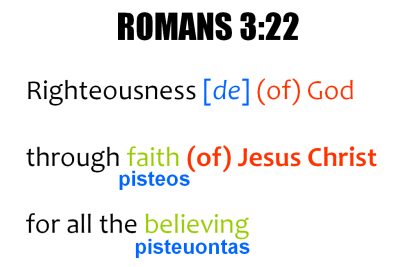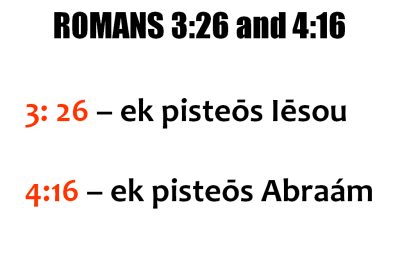THE FAITH OF JESUS CHRIST
Romans 3:21-31
 Click here to listen to this sermon.
Click here to listen to this sermon.
Thesis of Romans
- Romans 1:16-17
- Antithesis = 2:1 to 3:20
- Restatement of Thesis = 3:21 - 31
Redemption [3:24]
- 3:24 apolytrosis
- Context of slavery: apolytrosis is the means of liberating a slave
- Jesus is the means by which God has saved humans from the enslavement of sin
- Historical: Psalm 110:9 and Exodus 6:6
Expiation [3:25]
- hilasterion a difficult term!
- Reconciliation for a wronged party
- kipper - Hebrew cover over
Atonement
Cover of the Ark
- Sacrifice to a bloodthirsty God?
- Wrath in Romans 1:18-30
Expiation or Propitiation? Can I have a third option?
In other texts it is clear that this is a sacrifice. Romans is vague about the hilasterion being a sacrifice other than the mention of blood.
Paul is probably borrowing the word from its Jewish and ritual context. It is very Exodus.
There is a paradox here in that God propitiates God. Separating it out so that Christ propitiates God sets up a hero/villain battle.
Beware Vampire Christianity we need Christ for his blood.
Thesis Statements
- Gods righteousness is being revealed its news!
- Jesus is the means and agent through whom God is demonstrating it.
- Faithfulness and Righteousness are connected in a significant way.
What Is Faith?
- Leap of Faith
- Keep the Faith
- Blind Faith
- Full Faith and Credit
FAITH
Faith and Jesus Christ
- Faith in Jesus Christ (object)
- Faith of Jesus Christ (subject)
- Romans 3:22, 25, 26
- Is Paul referring to our faith in Jesus Christ or the faith/faithfulness of Jesus?


The Faith Of Jesus Christ
- Thesis The gospel of Jesus Christ [obedience and faithfulness]
- Antithesis Sin involves disobedience and faithlessness
From Paul's Letter to the Romans: A Socio-Rhetorical Commentary, by Ben Witherington, III:
Three arguments for Faith OF Jesus Christ
- It avoids the redundancy of Paul referring to Christian faith twice in 3:22. Both objective and subjective means are referred to: the righteousness of God is revealed through the faithfulness of Christ (the gospel) and it is revealed to all who believe. This explains from faith to faith in 1:16-17 (ek pisteos eis pistin).
- This reading gives proper force to the 2 prepositions through and unto one referring to means and the other to the ultimate object or recipient of the revelation.
- This comports well with the parallel clause (dia) in v 24. The gift of righteousness or being righted comes through liberation or ransom provided by the Christ-event.
So What Does It Mean?
- Jesus sacrifice is more than an offering of him.
- Jesus faithfully offers himself.
- Jesus reveals Gods way of making humans righteous with God.
- We share Christs faith (see 4:16)
- No contradiction with Galatians 2:16, Philippians 1:29, Colossians 2:5
If we translate faith as belief then we are concerned that we cannot know everything that Christ believed. But if we use the fuller meaning of faith as the complete human response then it makes more sense.
The is no contradiction of a confessional faith in Jesus Christ (as with the other texts). But the context of Romans shapes the interpretation.
Pauls Diatribe (3:27-31)
- Wheres our confidence?
- Is righteousness obtained through the law? No, faith.
- God is God of Jew and gentile.
- All accepted on faith.
- Faith does not destroy the law but strengthens it!
(We dont follow the law through understanding or legal inquiry, but through faith obedience of heart.)
Chris Benjamin
West-Ark Church of Christ, Fort Smith, AR
Evening Sermon, 23 November 2008
 Link to next sermon
Link to next sermon
 Link to other sermons of Chris Benjamin
Link to other sermons of Chris Benjamin


 Link to next sermon
Link to next sermon
 Link to other sermons of Chris Benjamin
Link to other sermons of Chris Benjamin